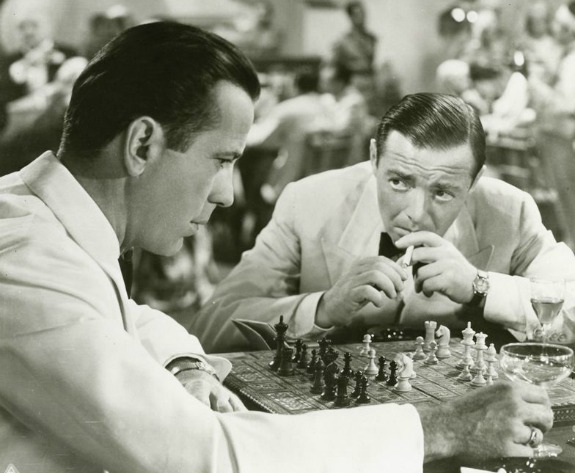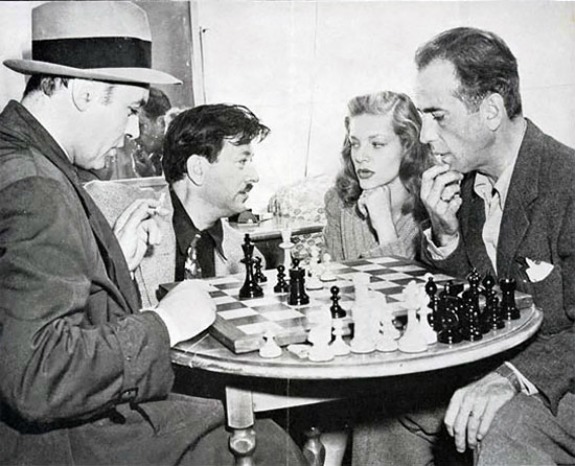In 1945, Warner Brothers heard about the Marx Brothers' plans to make a film called A Night in Casablanca which was to be a parody of their classic Casablanca (1942). To make sure that this parody (complete with a lead character named 'Humphrey Bogus') was not violating Warners' rights, the studio's legal department got in touch with the Marx Brothers asking for information on their upcoming film. The inquiry from Warners set Groucho Marx thinking, and he soon came up with a clever plan for a publicity stunt. While Warners had simply inquired about the film's storyline, Groucho claimed that the studio had threatened to sue the Marx Brothers for using the word 'Casablanca' in their film title. The correspondence that ensued between Groucho and the studio is now legendary (I must say I'd never heard of it before) and gave Groucho the free publicity he wanted.

Groucho's first letter to Warner Brothers, which was his response to a "long, ominous legal document" the studio had never written, is shown below (or rather an early draft). The letter is simply hilarious and without a doubt the funniest I have posted so far. Also shown below are excerpts from Groucho's two subsequent letters (in transcript only) which he had sent after the studio kept insisting on knowing the details of the story. As Groucho's answers were getting more bizarre, Warners finally gave up and Groucho never heard from their legal department again. In the end, director Archie Mayo decided not to turn A Night in Casablanca (1946) into a parody of Casablanca, but rather into a parody of the genre.
Transcript:
Dear Warner Brothers:
Apparently there is more than one way of conquering a city and holding it as your own. For example, up to the time that we contemplated making a picture, I had no idea that the City of Casablanca belonged to Warner Brothers.
However, it was only a few days after our announcement appeared that we received a long, ominous legal document, warning us not to use the name "Casablanca".
It seems that in 1471, Ferdinand Balboa Warner, the great-great grandfather of Harry and Jack, while looking for a short cut to the city of Burbank, had stumbled on the shores of Africa and, raising his alpenstock, which he later turned in for a hundred shares of the common, he named it Casablanca.
I just can't understand your attitude. Even if they plan on re-releasing the picture, I am sure that the average movie fan could learn to distinguish between Ingrid Bergman and Harpo. I don't know if I could, but I certainly would like to try.
You claim you own Casablanca and that no one else can use that name without their permission. What about Warner Brothers-- do you own that too? You probably have the right to use the name Warner, but what about Brothers? Professionally, we were brothers long before you were. When Vitaphone was still a gleam in the inventor's eye, we were touring the sticks as the Marx Brothers and even before us, there had been other brothers-- the Smith Brothers; the Brothers Karamazoff; Dan Brouthers, an outfielder with Detroit, and "Brother, can you spare a dime? " This was originally "Brothers, can you spare a dime?" but this was spreading a dime pretty thin so they threw out one brother, gave all the money to the other brother and whittled it down to "Brother, can you spare a dime?"
The younger Warner Brother calls himself Jack. Does he claim that, too? It's not an original name-- it was used long before he was born. Offhand, I can think of two Jacks-- there was Jack of "Jack and the Beanstalk" , and Jack, the Ripper, who cut quite a figure in his day. As for Harry, the older brother, he probably signs his checks, sure in the belief that he is the first Harry of all time and that all other Harrys are impostors. Offhand, I can think of two Harrys that preceded him. There was Lighthorse Harry of Revolutionary fame and a Harry Applebaum who lived on the corner of Ninety-third street and Lexington Avenue. Applebaum wasn't very well known-- I've almost forgotten what he looked like-- the last I heard of him, he was selling neckties at Weber and Heilbroner; but I'll never forget his mother, she made the best apple strudle in Yorkville.
We now come to the Burbank studio. This is what the Warner Brothers call their place. Old man Burbank is gone. Perhaps you remember him-- he was a great man in a garden, he was the wizard who crossed all those fruits and vegetables until he had the poor plants in such a confused and nervous state, that they never were sure whether they were supposed to come in on a meat platter or the dessert dish.
This is just conjecture, of course, but, who knows-- perhaps Burbank survivors aren't too happy over the fact that a plant that grinds out pictures settled in their town, appropriated Burbank's name and uses it as a front for their films.
It is even possible that the Burbank family is prouder of the potato produced by the old man than they are of the fact that from this town emerged "Casablanca" or even "Gold Diggers of 1931".
This all seems to add up to a pretty bitter tirade but I don't mean it to. I love Warners-- some of my best friends are Warner Brothers. It is even possible that I am doing them an injustice and that they themselves know nothing at all about this dog-in-the-Wanger attitude. It wouldn't surprise me at all to discover that the heads of Warners' legal department know nothing about this dispute for I am acquainted with many of them and they are fine fellows with curly black hair, double-breasted suits and a love of their fellow man that out-Saroyans "Dr. Gillespie". I have a hunch that this attempt to prevent us from using the title is the scheme of some ferret-faced shyster serving an apprenticeship in their legal department. I know the type-- hot out of law school, hungry for success and too ambitious to follow the natural laws of promotion, this bar sinister probably needled Warners' attorneys, most of whom are fine fellows with curly black hair, double-breasted suits, etc., in attempting to enjoin us.
Well, he won't get away with it! We'll fight him to the highest court! No pasty-faced legal adventurer is going to cause bad blood between the Warners and the Marxes. We are all brothers under the skin and we'll remain friends till the last reel of "A Night in Casablanca" goes tumbling over the spool.
 |
| Jack Warner (left) and Harry Warner, the oldest of the four Warner Brothers |
Below you'll find part of Groucho's second and third letter to Warner Brothers, who were still anxious to know what the film was really about.
Dear Warners:
There isn’t much I can tell you about the story. In it I play a Doctor of Divinity who ministers to the natives and, as a sideline, hawks can openers and pea jackets to the savages along the gold Coast of Africa.
When I first meet Chico, he is working in a saloon, selling sponges to barflies who are unable to carry their liquor. Harpo is an Arabian caddie who lives in a small Grecian urn on the outskirts of the city.
______
Dear Brothers:
Since I last wrote you, I regret to say there have been some changes in the plot of our new picture, “A Night in Casablanca.” In the new version I play Bordello, the sweetheart of Humphrey Bogart. Harpo and Chico are itinerant rug peddlers who are weary of laying rugs and enter a monastery just for a lark. This is a good joke on them, as there hasn’t been a lark in the place for fifteen years.

.jpg)


.jpg)























